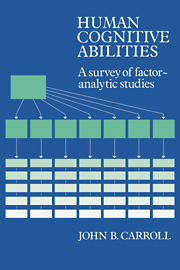Book contents
- Frontmatter
- Contents
- Preface
- PART I INTRODUCTION TO THE SURVEY
- PART II THE IDENTIFICATION AND DESCRIPTION OF COGNITIVE ABILITIES
- PART III ISSUES
- Chapter 16 A Theory of Cognitive Abilities: The Three-Stratum Theory
- Chapter 17 Issues About Abilities: Nature and Nurture, and Others
- Chapter 18 Implications and Recommendations
- References and List of Datasets
- Appendix A Codes for Countries, Samples, and Factors
- Appendix B Hierarchical Factor Matrix Files
- Name Index
- Subject Index
Chapter 17 - Issues About Abilities: Nature and Nurture, and Others
Published online by Cambridge University Press: 29 September 2009
- Frontmatter
- Contents
- Preface
- PART I INTRODUCTION TO THE SURVEY
- PART II THE IDENTIFICATION AND DESCRIPTION OF COGNITIVE ABILITIES
- PART III ISSUES
- Chapter 16 A Theory of Cognitive Abilities: The Three-Stratum Theory
- Chapter 17 Issues About Abilities: Nature and Nurture, and Others
- Chapter 18 Implications and Recommendations
- References and List of Datasets
- Appendix A Codes for Countries, Samples, and Factors
- Appendix B Hierarchical Factor Matrix Files
- Name Index
- Subject Index
Summary
This chapter considers a variety of issues that stem from the classic “nature vs. nurture problem” – centrally, how heritable are the cognitive abilities described in this survey, and to what extent are they products of the individual's environment and learning experiences? But also, how do they develop and change over the individual's life span? How malleable or improvable are they? Do abilities multiply and become differentiated as individuals mature and become exposed to different environments and learning experiences? Do factor structures differ across groups differing in sex, race, or ethnicity?
In the scope of this volume, no one of these issues can be given anything like the treatment it would deserve in a volume exclusively devoted to them. The approach taken here is briefly to summarize present knowledge and opinion, to draw attention to relevant information assembled in the present survey, and to suggest possible implications that the three-stratum theory may have for further research on these issues, none of which is close to resolution in contemporary scientific work.
Some of these issues have usually been studied with reference to global measures of intelligence such as IQs from standardized intelligence tests. In view of the known factorial complexity of global measures of intelligence, one can raise the question of whether the answers that have been thus far obtained on the various issues mentioned above are sufficiently precise and adequate.
- Type
- Chapter
- Information
- Human Cognitive AbilitiesA Survey of Factor-Analytic Studies, pp. 656 - 687Publisher: Cambridge University PressPrint publication year: 1993



